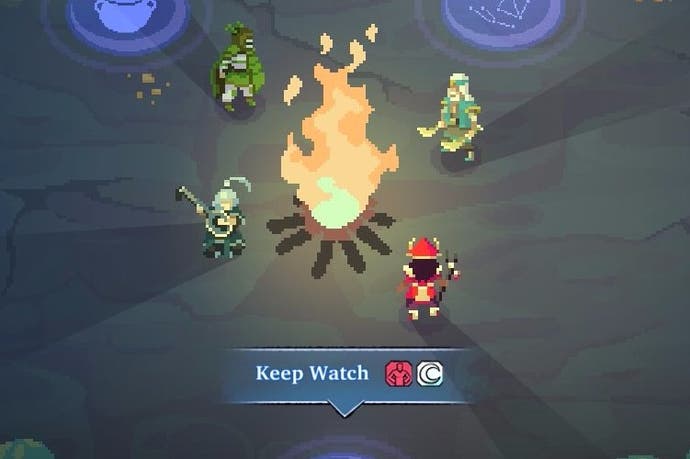The many myths of Moon Hunters
Meet the new god.
First time out I was a clumsy ritualist, able to conjure gravity wells and teleport dashes without a clue regarding how to really use them. I staggered around the forest as I tried to get my bearings. I picked a bad fight with a blonde wolf and I befriended a cat. I was known to be foolish. I was marked for death in three days. Stumbling towards the inevitable, I met a dancing woman in a cave. I saw another cave that smelled of blood, but I was not brave enough to enter. I died quickly, in a battle at the edge of a burning wood, and I became a constellation.
Second time out I was a witch, with a beam spell plucked from the Diablo Wizard playbook, and a handy collection of slash-and-smash attacks. Still cursed to die, still struggling with the blonde wolf, I tried to scare a bird from a holy tree while another bird, wandering into my camp at night, offered me a choice: dinner or companionship. I chose companionship, but it did little good. I met my end two days ahead of schedule, and became another constellation. The night sky was filling with my failures.
This is Moon Hunters, a wonderful procedural dungeon-crawler I've been playing on and off for a few days. The pixel art is delicate and bucolic, the music sounds surprisingly 4AD in places, and the premise is irresistible: the old god is dying, the new god is set to replace them, and for that to happen, you must die too. Unless you can fight back. Each playthrough is a different frantic course towards power, in other words, as you travel the land and improve yourself for a battle you know you will probably lose. There are class skills to buff with payments to merchants, and there are attributes to boost now and then, which will sometimes unlock different opportunities that come your way. There are recipes! You never saw such recipes! The idea behind it all, I think, is that each time you play you are writing a new myth, as the landscape is scrambled and the details of the adventure are rewritten. Only the objective is the same, a tale endlessly told.
It is an extraordinary feeling, like revisiting the same place and learning new things every time, new details that make the old details feel more comprehensible. It's like an old memory slowly returning over the course of a few days. It's like playing not one Zelda game but all of them - playing across the entire series and spotting the way that the tale is reworked beneath you as you go. You learn strange things: I know now that the shack I sometimes see in the forest can grow legs and run away. I know it can come back as a boss. I know that the wolf guards something that is worth risking death for. Each game I play, I pick up a handful of things like this, while the shifting, scrambling game grows in coherency around me, its rhythms settling into a groove, its individual elements growing stronger and clearer. Each playthrough is an underlining, a rescoring.
And each playthrough raises further questions. Why did the fox in the grotto run away when I approached, and how can I find that fox, that grotto, again? Who owns the fishing rod left dipping in a silvery river? Who left the guitar - sorry, lute - lying in the grass? I have finished Moon Hunters, or at least I have beaten the sun god and stopped his cult, but the moon god has yet to return, and I sense that the legend is very far from over.


